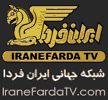November 17, 2009
Iran's media

تحليل خبرنگار صداي آمريكا از طرح رژيم براي مقابله با رسانه هاي بين المللي
Ali Nourizadeh of the London-based Center for Arab and Iranian Studies says Iran thinks that by spending $50 million it can rival Western broadcasters, but he doubts it will succeed
According to state-run Press TV, a three-member parliamentary committee has been set up to work out the details.
The original bill allocated $20 million for that purpose, but legislators decided to raise the amount to $50 million after hearing the U.S. Congress voted to set aside $50 million for broadcasting to Iran.
Many Western media analysts complain Iran's overseas broadcasting operations are biased. The British government media watchdog OFCOM is currently investigating Press TV, which is based in London, over complaints of "breaching accuracy and impartiality guidelines."
Press TV frequently criticizes the U.S. and British governments in its new bulletins and its criticism of Israel is invariably scathing. It also often totally ignores student protests and opposition demonstrations in Iran.
Topics of discussion on Press TV are also frequently absurd. A Press TV announcer recently suggested the United States could be in the throes of a secessionist movement, claiming that Texas and Vermont want to secede from the Union.
Iran's Arabic-language network, which is aimed at a mostly Middle Eastern audience, also ignores internal dissent and criticizes Arab governments along with the United States and Britain.
In a recent broadcast, al-Alam TV alleged, without any independent evidence, there had been a coup attempt in Saudi Arabia and that Prince Bandar, the son of Crown Prince Sultan, was under arrest.
Two Arab satellite broadcasting corporations, Nilesat and Arabsat, recently refused to allow al-Alam to continue broadcasting on their frequencies, provoking protestations from Tehran. A French satellite company eventually allowed al-Alam to resume broadcasting on its frequencies.
Ali Nourizadeh of the London-based Center for Arab and Iranian Studies says Iran thinks that by spending $50 million it can rival Western broadcasters, but he doubts it will succeed:
"The Iranians know the effect of international media, especially those Farsi-speaking media like Voice of America and the BBC. They have a lot of effect because they report almost by the minute what is happening in Iran. On the other hand, the Iranian media which broadcast to the West like Press TV and Al Alam have certain limits and all sorts of red lines. Therefore, they are looking to have more compatible media to challenge those stations, which broadcast to Iran, and I do not think they are going to succeed, because of the limit they have in order to talk about issues we talk about. They cannot talk about the other side. Always, the other side in Iran is pictured as the agent of the West and of the United States. Mr. Mousavi, for instance, would not have a chance to come to Press TV and talk. Only certain people can use this window, only certain people can be interviewed," Nourizadeh said.
During a media conference in Tehran over the weekend, the head of Iranian state TV (IRIB) Ezzetollah Darghami said Iran must "work to combat Western propaganda."
Iranian opposition leaders Mirhossein Mousavi and Mehdi Karroubi, who have not spoken on Press TV since a controversial presidential election in June, both complain that IRIB is unfair and biased in its coverage.
Much of Iran's media, including newspapers, magazines, press agencies, radio stations, Web sites and some TV programs are under the control of Iran's Revolutionary Guards, says Ali Nourizadeh. He also thinks that it will probably run Iran's new media arm, dubbed Atlas, as well.

